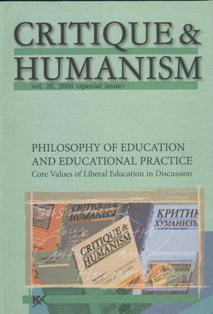Anthropological research in education. Towards a historical-cultural anthropology of education
Anthropological research in education. Towards a historical-cultural anthropology of education
Author(s): Christoph WulfSubject(s): Anthropology
Published by: Фондация за хуманитарни и социални изследвания - София
Keywords: anthropology; education; historical-cultural anthropology; knowledge; ethnology; educational anthropology,
Summary/Abstract: Since the very beginnings of Western thought, anthropology and education have been linked. Even though the term ‘anthropology’ was only coined in the 16th century (Marquard 1971), and even though using it anachronistically, avant la lettre, is somewhat problematical, the resonance between education and anthropology is manifest in Plato’s Republic as well as in the writings of St. Augustine and St. Thomas of Aquinas. This resonance cannot be denied: neither in the 17th century in the works of Comenius, nor in the 18th century in the writings of Rousseau and Pestalozzi, nor yet in the 19th century in Kant’s, Herbart’s, Humboldt’s, and Schleiermacher’s oeuvre. In the course of the 20th century, anthropology and anthropological modes of observation grew steadily in infl uence in numerous academic disciplines, and particularly within philosophy. Max Scheler sees the starting point of this interest in anthropology in the following situation: “In about ten thousand years of history, our era is the fi rst in which man has become ‘problematical’ through and through, but also the fi rst in which he does not know what he actually is, and at the same time knows he doesn’t know.” That situation constitutes the starting point of educational anthropology, which has, since the second half of the 20th century, developed into an important fi eld of educational knowledge.
Journal: Критика и хуманизъм
- Issue Year: 2008
- Issue No: 26
- Page Range: 159-170
- Page Count: 12
- Language: English
- Content File-PDF

